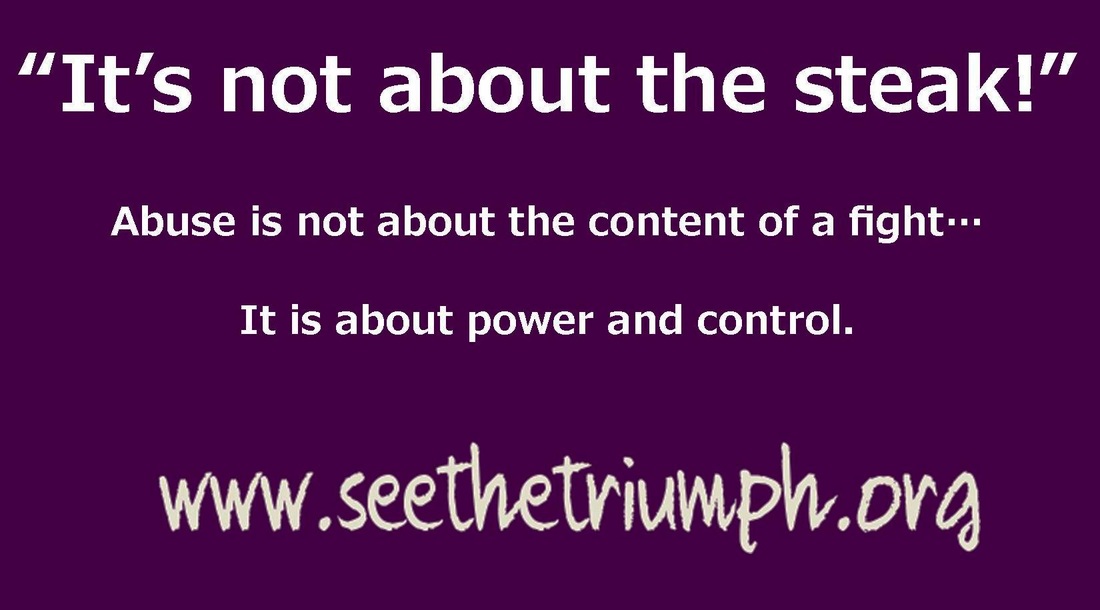|
By Christine Murray, See the Triumph Co-Founder
One of my simple pleasures in life is reading the newspaper every morning. I love getting up to date about the news of the day, learning about events and happenings in my community and beyond, and getting a daily dose of information about the important issues happening in the world around us. And yet, there are times when my daily newspaper reading turns into disappointment, frustration, and anger over upsetting news about injustices in the world around us. As one who cares deeply about ending intimate partner violence, some of my biggest frustrations come up when reading the paper and seeing stories about new cases of domestic violence. Every new story simply breaks my heart, because I believe that every person has a right to safe and healthy relationships. Beyond my frustrations when I read about cases of domestic violence, I, like many professionals who work to address domestic violence, get frustrated by the way that this issue is often covered in the media. For example, I remember one morning a few years ago reading about a man who had beat his female partner, which the newspaper stated happened because she didn’t cook his steak the way he liked it. If you could have read my mind at the moment I read that, you would have heard it screaming, “It’s not about the steak!!!!!!!!” In my view, the reason that man beat his partner had nothing to do with the way she cooked his steak, and it had everything to do with power and control. If you think that this story about the steak is an isolated incident, think again. Check out these examples of other “reasons” that media outlets gave for incidents of violence in the past month or so. I’ve bolded the alleged reasons for the violence in the list below:
It’s natural for people to want to try and explain why violence occurs. And, reporters have a responsibility to state the known facts of the stories they report. However, reporting overly simplistic reasons for abuse is problematic for at least two important reasons. First, by trying to identify these situational causes of domestic violence incidents, reporters trivialize the violence and inadvertently misinform readers about the dynamics of abusive relationships. By confusing the real reason that abuse occurs--because one partner is trying to control the other--the wrong message gets sent to the community and perpetuates the stereotype that domestic violence occurs as a result of a unique fight or one person’s inability to manage his or her anger. Second, by reporting on victims’ actions before a violent incident occurred, media stories imply that the victim may somehow have been to blame for the violence they experienced. These stories suggest that, had the victims just cooked the steak properly, not asked to use the bathroom on a long car ride, or not ate the fried chicken leftovers, the violence would not have occurred. Professionals who work to address domestic violence know, however, that the violence almost certainly still would have occurred, there just would have been a different triggering incident that set it off. Again, the abuse is not about the content of a fight...it is about power and control. Of course, we need ongoing media coverage about the issue of domestic violence to continue to raise awareness in the community and demonstrate the scope of the problem. But what if, instead of saying that violence occurred because of the specific incident that triggered the reported act of violence, reporters used language like the following: “The perpetrator hurt the victim because they were trying to hold power over their partner”? Now, I recognize that this is probably an overly idealistic vision for how the media will report cases of domestic violence. However, in order to fully end the stigma surrounding intimate partner violence, it’s important for the media to report on these cases responsibly. Such responsible reporting will help to educate the public about the issue and accurately depict the dynamics of abusive relationships. Comments are closed.
|
Archives
July 2024
CategoriesAll About Intimate Partner Violence About Intimate Partner Violence Advocacy Ambassadors Children Churches College Campuses Cultural Issues Domestic Violence Awareness Month Financial Recovery How To Help A Friend Human Rights Human-rights Immigrants International Media Overcoming Past Abuse Overcoming-past-abuse Parenting Prevention Resources For Survivors Safe Relationships Following Abuse Schools Selfcare Self-care Sexual Assault Sexuality Social Justice Social-justice Stigma Supporting Survivors Survivor Quotes Survivor-quotes Survivor Stories Teen Dating Violence Trafficking Transformative-approaches |
Search by typing & pressing enter



 RSS Feed
RSS Feed